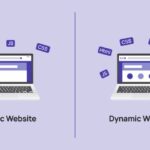
Having a website is indispensable for businesses aiming to thrive in today’s digital environment. Here’s a comprehensive summary of the top 10 reasons why having a website is crucial for your company’s growth and success:
Unmatched Accessibility:
24/7 Availability: A website allows your business to be accessible at all times, providing potential customers with the ability to learn about your products and services at their convenience, regardless of time zones.
Global Reach: It eliminates geographical barriers, enabling you to reach a worldwide audience and engage with customers from different regions.
Google Visibility:
Search Engine Optimization (SEO):A well optimized website increases your visibility on search engines like Google, helping attract organic traffic and new customers who are actively searching for your products or services.
Discoverability: Being discoverable online ensures ongoing business success as more people can find and learn about your business.
Increased Reputation:
Credibility and Trust: A professional, well designed website enhances your business’s credibility and trustworthiness. Customers are more likely to engage with a company that has a strong online presence.
Reviews and Testimonials: Displaying customer reviews and testimonials on your website further builds trust and influences potential customers’ decisions.
Clarity in Product/Service Presentation:
Detailed Showcase: Websites allow you to clearly present your products and services with high quality images, detailed descriptions, and specifications, helping customers make informed decisions.
Highlight Features: You can emphasize unique selling points and benefits, making your offerings more attractive.
Economical Marketing:
Cost Effective Campaigns: A website serves as a cost effective platform for digital marketing campaigns, including social media advertising, email marketing, and content marketing.
Analytics and Insights: Online marketing through a website allows for precise tracking and analytics, enabling you to measure the effectiveness of your campaigns and adjust strategies accordingly.
Continuous Customer Connection:
Easy Communication: Websites provide multiple channels for customers to contact you, such as contact forms, email addresses, and phone numbers, facilitating seamless communication.
Updates and News: You can keep customers informed about new products, services, promotions, and company news through blog posts and newsletters.
Smooth Client Experience:
User Friendly Design: A well designed website ensures a positive user experience with easy navigation, fast loading times, and mobile responsiveness, enhancing overall customer satisfaction.
ECommerce Capabilities: For businesses selling products online, ecommerce functionality allows for smooth transactions and secure payment processing.
Brand Identity Development:
Consistent Branding: A website is a powerful tool for conveying your brand identity and values. Consistent use of logos, colors, and messaging helps build a strong, recognizable brand.
Emotional Connection: By sharing your brand story and values, you can create an emotional connection with your audience, fostering loyalty and engagement.
Customer Service Improvement:
Centralized Support: A website can host a variety of customer support resources, such as FAQs, user guides, and live chat support, helping customers find answers quickly and efficiently.
Self Service Options: Providing self service options reduces the workload on your customer support team and improves customer satisfaction.
Establishing Industry Position:
Digital Presence: Having a website establishes your business’s presence in the digital space, allowing you to showcase your expertise and offerings.
Competitive Advantage: It positions you as a serious player in your industry, helping you stay competitive and attract new business opportunities.
By leveraging these advantages, businesses can use their websites to reach new customers, build trust, and drive sustained growth. Platforms like WordPress make website creation accessible and cost effective, allowing even nontechnical users to establish a robust online presence.
-
How does having a website improve a business’s visibility and reach?
-
In what ways does a website contribute to building credibility and trust with customers?
-
What are the cost effective marketing benefits of having a website?



